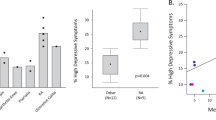Abstract
Many immunodepressive drugs have an unusual side effect on the patient’s mood: they often make the patient happier. This side effect has been observed for many different immunodepressive drugs, with different chemical composition. Thus, it is natural to conclude that there must be some general reason for this empirical phenomenon, a reason not related to the chemical composition of any specific drug—but rather with their general functionality. In this paper, we provide such an explanation.
Access this chapter
Tax calculation will be finalised at checkout
Purchases are for personal use only
Similar content being viewed by others
References
E.S. Brown, P.A. Chandler, Mood and cognitive changes during systemic corticosteroid therapy. Primary Care Companion J. Clin. Psychiatry 3(1), 17–21 (2001)
E.S. Brown, D.A. Khan, V.A. Nejtek, The psychiatric side effects of corticosteroids. Ann. Allergy Asthma Immunol. 83(6), 495–504 (1999)
D.A. Khan, E.S. Brown, T. Suppes, T.J. Carmody, Mood changes during prednisone bursts for asthma. Am. J. Respir. Crit. Care Med. 159, A919 (1999)
D.M. Mitchell, J.V. Collins, Do corticostroids really alter mood? Postgrad. Med. J. 60, 467–470 (1984)
D. Naber, P. Sand, B. Heigl, Psychopathological and neurophysiologocal effects of of 8-days corticosteroid treatment: a prospective study. Psychoneuroendocrinology 21, 25–31 (1996)
K. Wada, N. Yamada, H. Suzuki, Y. Lee, S. Kuroda, Recurrent cases of cortiosteroid-induced mood disorder: clinical characteristics and treatment. J. Clin. Psychiatry 61(4), 261–267 (2000)
Acknowledgements
This work was supported in part by the National Science Foundation grants 1623190 (A Model of Change for Preparing a New Generation for Professional Practice in Computer Science), and HRD-1834620 and HRD-2034030 (CAHSI Includes), and by the AT&T Fellowship in Information Technology.
It was also supported by the program of the development of the Scientific-Educational Mathematical Center of Volga Federal District No. 075-02-2020-1478, and by a grant from the Hungarian National Research, Development and Innovation Office (NRDI).
The authors are thankful to all the participants of the 27th Joint NMSU/UTEP Workshop on Mathematics, Computer Science, and Computational Sciences (Las Cruces, New Mexico, April 2, 2022) for valuable suggestions.
Author information
Authors and Affiliations
Corresponding author
Editor information
Editors and Affiliations
Rights and permissions
Copyright information
© 2023 The Author(s), under exclusive license to Springer Nature Switzerland AG
About this chapter
Cite this chapter
Ramos, J., Trejo, R., Vazquez, D., Kreinovich, V. (2023). Why Immunodepressive Drugs Often Make People Happier. In: Ceberio, M., Kreinovich, V. (eds) Uncertainty, Constraints, and Decision Making. Studies in Systems, Decision and Control, vol 484. Springer, Cham. https://doi.org/10.1007/978-3-031-36394-8_8
Download citation
DOI: https://doi.org/10.1007/978-3-031-36394-8_8
Published:
Publisher Name: Springer, Cham
Print ISBN: 978-3-031-36393-1
Online ISBN: 978-3-031-36394-8
eBook Packages: Intelligent Technologies and RoboticsIntelligent Technologies and Robotics (R0)




